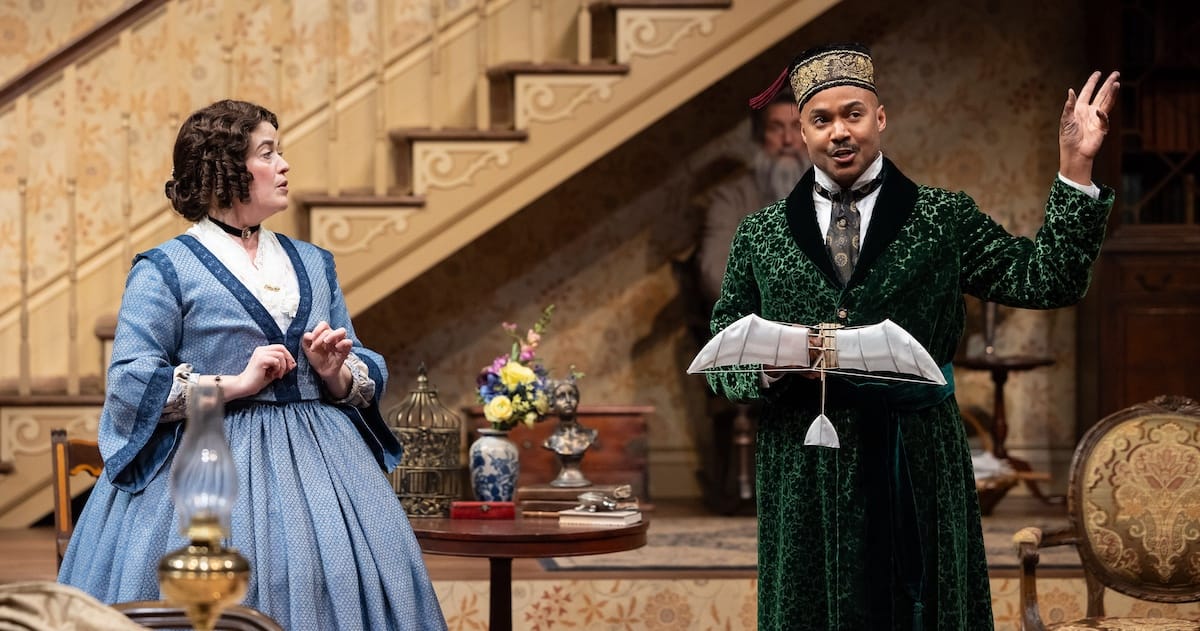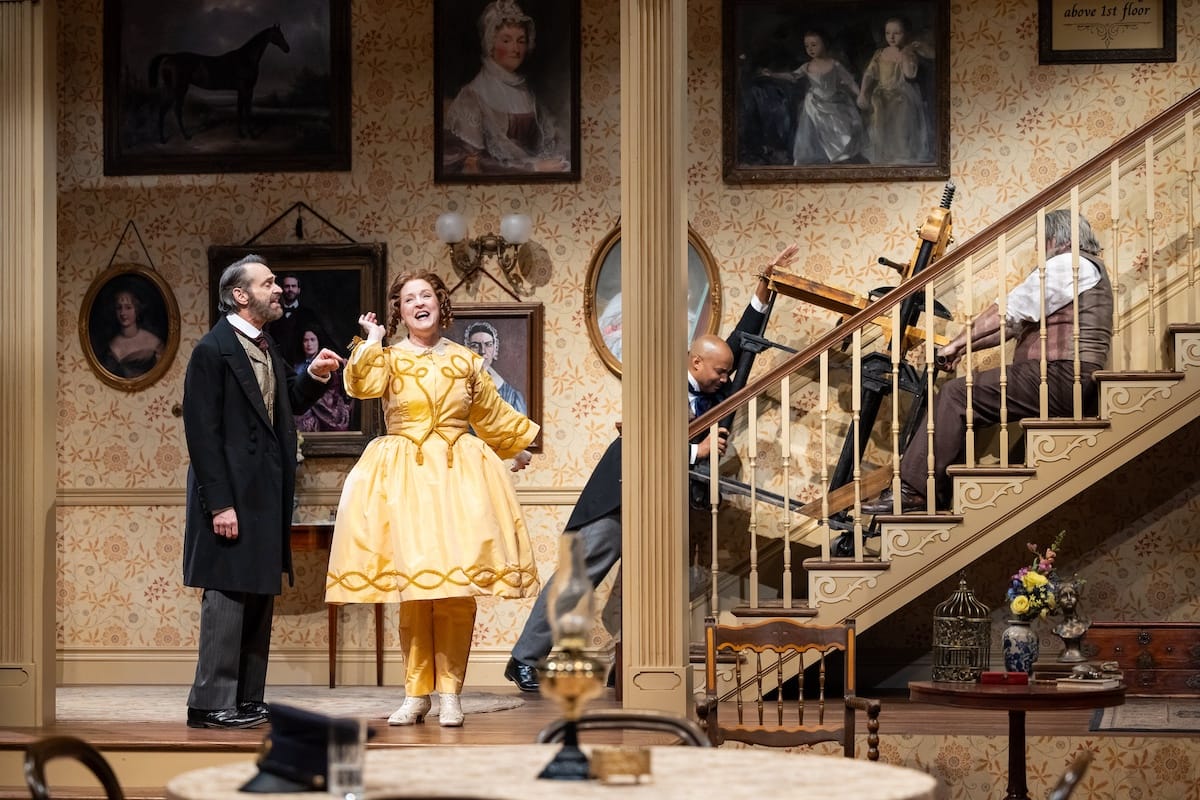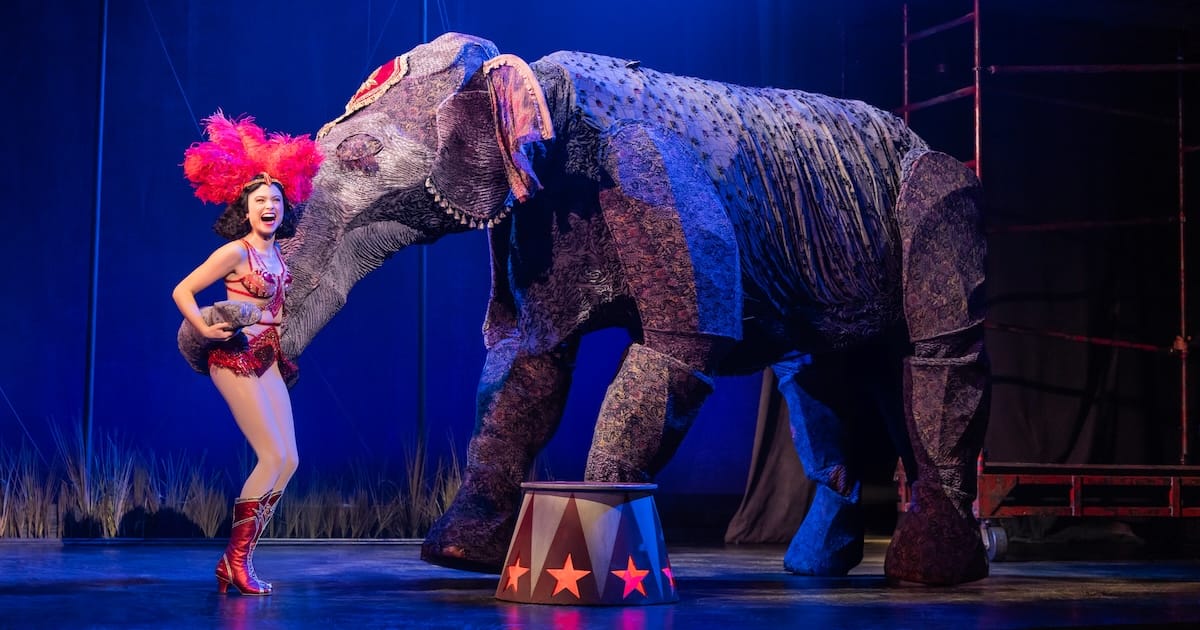Sandy Rustin’s The Suffragette’s Murder now up in a world premiere at the Denver Center.
A killing. A seance. A women’s movement. The Suffragette’s Murder by Sandy Rustin is an amusing romp that explores weighty topics – sexism, racism and inequality – in the guise of a comedic whodunit. It’s another world premiere production coming out of the DCPA’s Colorado New Play Summit.
Directed by Margot Bordelon, the action happens in New York’s Lower East Side on July 5, 1857. It’s set in a boarding house that doubles as Manhattan’s undercover suffragette headquarters, where most tenants support women’s right to vote. When one of the boarders goes missing, a policeman visits to ask questions, exposing long-held secrets. Without giving spoilers, the mystery isn’t necessarily in finding out who killed that tenant; it’s in unearthing those secrets. As the play unfolds, characters aren’t who they seem on the surface or at their core.

Megan Hill and Curtis Wiley in ‘The Suffragette’s Murder.’ | Photo Jamie Kraus Photography
Suffragette’s is at its best when it dives into sexism topics. The main character, Alma Mayhew (Megan Hill), leads the underground suffragette movement with her husband, Albert Mayhew (Matthew Boston). These two are a team — or so we think. As the play goes on, we learn maybe they aren’t the united front we believe in the beginning. The female characters uncover many familiar struggles – issues with motherhood, of being a wife, owning a bank account, possessing property and even charting their own destiny. When a character suggests in a century (1957), women will have a better life, it draws the expected, uncomfortable laugh from the audience.
While delving into inequality, the play also shines a light on racism. Tennyson Jennings (Curtis Wiley) is a Black man helping the suffragettes. In 1857, Jennings wouldn’t have been able to vote in New York either. Wiley is excellent as Jennings, but the character seems almost an afterthought — as if jammed in to continue exposing inequality. Jennings also fits the “magical negro” trope – the wise, Black character who helps white protagonists even to his detriment. A genius, Jennings seems short-changed by assisting a group of white women instead of himself.
The play’s ending is wonderfully unsatisfying, leaving some relationships unresolved without redemption. One could argue that Mrs. Mayhew reclaims her power as she promises to meet other suffragettes on the leading edge of the movement. Instead of feeling triumphant, though, it’s a hollow victory. Her comfortable life is gone, and ugly truths have been revealed, changing her forever. The course she is permitted to chart is a mystery, too; she’s given opportunities she was unaware of at the beginning of the play. (And it takes another 50-plus years for women to get the vote.)

(L-R) Matthew Boston, Linda Mugleston, Curtis Wiley and Gareth Saxe in ‘The Suffragette’s Murder.’ | Photo Jamie Kraus Photography
Each of the actors has impeccable comedic timing, including nailing slapstick. One scene where the characters Archibald Orton (Gareth Saxe), Jennings (Wiley) and Miriam Adams (Linda Mugleston) haul a printing press down flights of stairs is particularly funny. Annie Abramczyk (as Mabel Adams) is enjoyable as the over-the-top clairvoyant. Rowan Vickers is fun as the lovable, if somewhat stereotypical, Irish man (Leopold Albright).
The set design by Reid Thompson and costumes by Beth Goldenberg are impressive. Drawing-room paintings, antique furniture and neo-classic columns show the Mayhews’ wealth. Velvet hoop-skirt dresses and Mabel Adams’s seance costume reflect the Victorian era. Jennings’ elaborate robe and fez are fine details of a Far East fashion fad during that time period.
Rustin’s script packs a lot of history and politics into this zany play. It’s fast-paced and fun but not simply frivolous. It’s a balance between a comedy and weighty analysis of women’s rights, even today.
Tami Matthews loves theatre and studied under Charles Gordone (winner of the Pulitzer Prize for 'No Place to Be Somebody') at Texas A&M. Instead of pursuing a career as a playwright or dramaturg, she went into marketing, where she's spent 20+ years focusing on writing, public relations, digital marketing, and content marketing. She's written a book, 'Starstruck,' and contributed to articles about Star Trek. In her spare time, she volunteers for various causes, watches science fiction, and goes to the theatre.





Leave A Comment